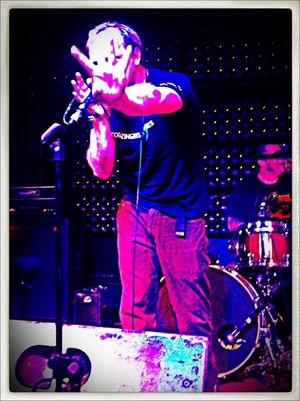Hey y’all! McEric here with a review and interview for the new thriller DIG, from Lionsgate and Saban Films, starring Thomas Jane (THE PUNISHER, THE LAST TIME I COMMITTED SUICIDE), Emile Hirsch (INTO THE WILD, SPEED RACER), Liana Liberato (BANANA SPLIT, THE BEST OF ME), and Jane’s daughter, Harlow Jane. Directed by K. Asher Levin (SLAYERS), the film releases this Friday, September 23rd to theaters and Video on Demand.
The synopsis reads: Steve Brennan (Thomas Jane) is trying to piece together a life shattered by a road rage incident that killed his wife and left his teen daughter Jane (Harlow Jane) deaf and resentful of him. Still hoping to mend things with Jane a year later, Brennan accepts a contract for a high-paying demolition job in the desolate New Mexico sprawl outside Las Cruces. When he and Jane arrive at the site, they are suddenly taken hostage by a dangerous couple, who will stop at nothing to retrieve what lies beneath the property. Now father and daughter must work together to outsmart their captors and survive the grueling night.
Check out the trailer:
DIG is something of an anomaly; a taut, claustrophobic thriller set in the intimidating expanse of the New Mexico desert. It features dynamic actors phoning it in at times and hamming it up at other times. Some of the events make perfect sense and seem a startling revelation in this medium of heightened reality whereas other decisions seem completely nonsensical and made only to extend the runtime. It features a slow burn opening and then an abrupt ending. It’s all over the place while still being small and self-contained. It’s a wonder, and I can’t decide if it’s the good or bad kind.
To get some more insight on the film I spoke with its director K. Asher Levin, who talks at length about wearing his inspirations on his sleeve, working with legends that have become friends, and his inspiration for telling a heartfelt story about family and tragedy.
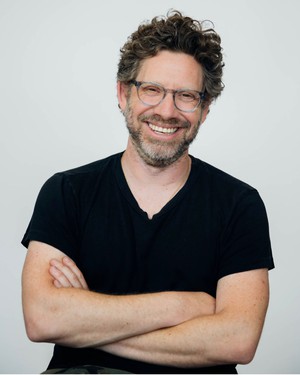
Eric McClanahan: So, let’s just dive right into it. We’re talking about DIG. Thomas Jane, Emile Hirsch. Two huge names, right off the bat. Both amazing actors. I’ve been a Tom Jane fan… forever. Ever since I saw THE LAST TIME I COMMITTED SUICIDE, that was just his standout role for me. So, what was it like working with actors of this caliber?
K. Asher Levin: Well, they’re both friends of mine at this point. I did SLAYERS with Thomas before this and then we did DIG. We’re doing two more together in the next few months and I also produced a movie he was in earlier this year. I consider him like an uncle at this point. An incredibly sweet guy, obviously a little eccentric as everyone knows, and we operate on a similar wavelength; we have similar interests. He’s a cinephile, I’m a cinephile. He loves both high and low art, filmwise, as I do, and he’s just an awesome guy to hang out with. Emile, on the other side of this, is someone I had known through being an LA kid; he’s an LA kid so I knew him through friends. He’s such an incredible mammoth kind of actor and a very different actor than Thomas and it was really fun, this idea of pairing them together. This was my first film with Emile. I did another one that’s coming out later this year or early next year and we’re prepping right now for a film we’re going to shoot in about five weeks together. I’m of the mindset of working with people that you can be familiar with. Part of my directing style and part of the directors I love. I’m sure you could tell, and I’m sure we’ll talk about this in a little bit, I have reverence for New Hollywood-style filmmaking and everything that goes with that.
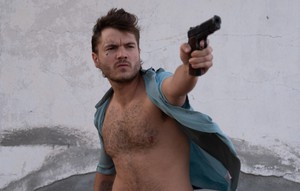
EM: I actually noticed when the end credits were rolling where it says “The Producers would wish to thank…” you actually name drop some of your influences in that end crawl.
AL: I do.
EM: Remind me who they were.
AL: Shit. I don’t even remember. For each movie I give a shout out to people that I use as templates. I guess I’d say I’m similar to Soderbergh in terms of doing big movie-watching lists beforehand, and I know that Edgar Wright does that, too. And Tarantino, of course. I want to make sure that audiences who like my movie can see this special thanks and go back and see who those influences were. It’s like when I was a teenager and I would listen to a rap song then I’d go back and listen to what the sample drops were and become fans of that music. I would say for this one, just off the top of my head, obviously Scorsese, I think I mentioned Tarantino, Clint Eastwood.
EM: Eastwood, definitely.
AL: Yeah. Friedkin, a little bit. Also Walter Hill. I don’t know if I put him in there. Soderbergh. On the other film I just put out, it’s a little more horror-driven, so I put DePalma. I don’t think I put DePalma on this one. But I will say a global shout out to DePalma because he’s one of my favorite filmmakers; he’s so flexible with genre but seems to be so specific with style that no matter what genre of film he’s doing you just know that it’s a DePalma film. On the biggest budgets or smallest budgets, comedies, horror, action, etc. I think I only employed a couple of tricks from DePalma on this one. You saw the film?
EM: Oh yeah.
AL: The scene with the “poor man’s walkie talkie” thing, I did the push-in on the ear and the push-out on the other end which is very DePalma. And set pieces, in general, I know there are plenty of other filmmakers, but I know when I think about an action thriller set piece, I think about Hitchcock and DePalma, the masters of the craft, and… yes! Did I do well with remembering the people I credited?
EM: Yeah, I distinctly recall Eastwood and Friedkin, so you nailed it.
AL: Friedkin because, and this is one of the reasons that I brought Emile in, why I thought of him initially when I read the script, was KILLER JOE, which is great fucking movie.
EM: It is a great movie.
AL: Great script, as well. Tracy Letts is an incredible playwright. It was so great. And Friedkin, in general, is great. I don’t know why he’s fallen out of vanguard. He and DePalma are ones that people like to mention in like Top 40 but these guys to me are Kings of Punk Rock Filmmaking. That’s a long-winded answer, I suppose. I started as a writer so I tend to dance around things.
EM: That actually does lead into my next question. I see you co-wrote SLAYERS, which you mentioned you wrapped before this. This script, however, was written by the Ablakhad Brothers, who were also producers. So what made you want to make this film?
AL: I have a complicated relationship with screenwriting. I started as a screenwriter. I started writing scripts when I was 14, then went to NYU for screenplay writing and the first script I made was on the Blacklist and then I decided I didn’t want to write scripts anymore, I just wanted to direct. So now when I look at a film I always think about the script and the performances and the way things work from the time I first look at the script until I’m on set. I always advise actors before they get to set to be ready to hear my voice in the room, because I’m a very vocal person and a very vocal director, and I often change lines if they don’t seem to be clicking in the middle of a take. I’ve heard a rumor that David O. Russell does that; he’ll just scream “Ah, do it this way!” And I know Adam McKay does it, too. But it’s definitely a part of my process, a constant conversation with the actors when we’re in the scene. And my cinematographer. So I’m almost writing and rewriting while I film a lot of the time. In regards to this script, it was a little different when I first got it. I liked the essence, specifically, between Thomas, who is such an underused actor; not an underused star, but an underused ACTOR; the relationship between Thomas’s character and his daughter, who is played by his actual daughter in the film. It was such an interesting wrinkle in the FUNNY GAMES setup. The part that wasn’t 100% realized yet was certainly Emile’s role and Liana’s role as the villains in the film. At the time the film was more Black Ops, kind of dirty cops on the other side. Myself, being such a fan of Tarantino and Soderbergh and classic KISS KISS BANG BANG setups, I like the idea of these sort of fun-loving criminals on the other side of this more emotional thing. Also, at the time, I had just gone through a lot of health issues, personally. While I was shooting SLAYERS I was going through immunotherapy for melanoma cancer and my wife, coincidentally, had a brain tumor, which was benign, and it was also the Pandemic. So we’re going through all of this crazy shit, and I was working through it partially with the vampire film but I really wanted to find another outlet. And this is actually a pretty funny story, and though I don’t like to name drop, at all, because I’m from LA and it’s so annoying when everyone does, but what I will say is the script was brought to me by my producing partner Daniel Cummings who was already working on it with Thomas and I had a Zoom with Cameron Crowe, who had about my and my wife’s health stuff because he’s very close with my father-in-law, my wife’s dad. He was trying to convince me to write a script about it, about my experience. He said “This is great. It’d be an amazing script. Blah blah blah.” And I was like “Yeah, that’s not really what I do. It’s what you do. That’s not my vibe, man,” But when I got off the Zoom I looked at the script for DIG and I fell in love with the thought of a family, specifically a father and daughter, who are torn about by trauma and then ultimately brought back together by trauma. It felt like a really honest and unique story that I understood based on experiences with my family, my wife, during this year that we had so many issues. Obviously now we’re on the other side of it, but I think that was the core. I’m not a particularly sentimental person so I wanted to throw a monkey wrench into that core, or almost an emotional pipe bomb with regards to Emile’s character and Liana’s character and having them be so wildly different. I also loved the idea in the script, in the beginning, of this lion who is kind of maimed emotionally and then is tried, almost biblically tried, for so much of the movie and then suddenly awakens again at the end and fully realizes himself. Thomas is such a fantastic movie star who doesn’t want to be a movie star, just a great person, and then Emile is such a wiley character actor who is a leading man, as well. So you have these two guys who can both be leading men who are really serious character actors, and their processes are very different, too. So I guess that was the initial draw, and also… these are movies I like. Horror movies are fun, but thrillers, specifically crime thrillers, are the movies I’ve been watching since I was five years old. I love them. Hitchcock was my first favorite director, and everything from there on telegraphs that. My grandfather used to show me old 1940s gangster movies, rest in peace, and this movie felt a little bit like DESPERATE HOURS, a classic film, and not-so-classic remake, and I felt like this script had a lot of stuff there already, and it’s great as a director to find a script like that because you can dive in and tool around make some changes with the writer and find the essence of what works and what doesn’t. For many years, when I was young, I was paid to do that. I don’t really care about having a writing credit on a film. If I’m producing and directing then I likely have a hand in where the screenplay is going. And with some of my favorite directors it’s the same shit. Kubrick, Scorsese, Spielberg, Hitchcock. They’re why they came up with the title “auteur” because that was a way of saying that if you’re a director that doesn’t write but all of your movies look the same, you probably have a hand in all the stuff.
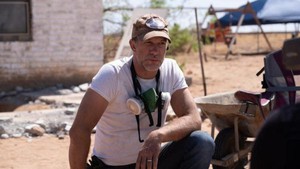
EM: Yeah, that makes perfect sense. Speaking to the wildly different personalities of the villains and heroes of the film, the film itself, being set in the arid desert, which is wide and threatening in that sense, but then having such a claustrophobic central story, talk about balancing that dichotomy.
AL: Yeah, I’m going to give credit to the writers for the mood and the world that they created. I think that they were the ones that created an atmospheric element around a pretty tight, classic sort of Elia Kazan drama. Most of this movie is Actor’s Studio shit; it’s people in a room with a gun, basically, which is great, but I think that the writers had a greater depth of tone that really never changed from the first time I read it, to be honest. My additions were really just little things here and there with regards to the characters and building out setpieces. I had always kind of thought, “I just shot a movie in New Mexico. I like shooting in New Mexico. We’ll shoot this in New Mexico and it’ll feel like a Neo-Noir.”Aand desert noirs are the best, unless you’re talking about Southern Gothic, I guess they kind of go hand-in-hand. I haven’t done a cold weather one yet, which would complete the triumvirate of great Noir that is sort of not the traditional sense. And there was a very sort of esoteric, existential vibe to the way that it was written. These people know that they’re going to die, pretty much, and they’re set to do work that is their last work, particularly Thomas’s character, and the fact that there’s an arid desert around them… there’s nothing. They’re nowhere and there’s nowhere for them to go. It’s almost more terrifying than being locked in a basement, because at least in a basement you’re on a suburban street or something. Here there’s miles and miles of nothing. That’s why we set up the initial session where I drive in to the area to show how vast it was, and the place we shot really was. I feel like it added a character that we were all out there and once I really embraced what the screenwriters were going for in that regard I think I really dug into creating a modern western with thriller elements in that way. Fully embraced. We shot on a ranch that had an old saloon in it. We had many long nights prepping and sometimes still shooting, and there was definitely an outlaw element to the way we shot the movie, for sure.
EM: Excellent. I think that’s time if I have my time right. Best of luck on the film, and SLAYERS, also.
AL: Yeah, let’s get back together for SLAYERS and have a conversation.
EM: Absolutely.
AL: And finally, just for writing stuff, another shout out to the screenwriters for a great script, my cinematographer Stephen [St. Peter], and my editor Marc [Fusco] who I worked with and was really able to make things tight. These films can get boring. [laughs] It’s just a lot of people in a room, but a thing that a lot of people have said about the film is that it feels like an adrenalin ride, it’s pretty unrelenting, and that’s due to Marc Fusco, my amazing editor, so shout out to him. Just to make sure respect is due where it is because I certainly don’t know how to edit anything. I couldn’t even edit my conversation with you! [laughs] But I look forward to chatting again with you soon.
EM: Thank you again. Bye.
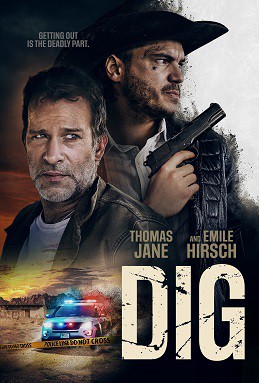
DIG releases tomorrow in select theaters and Video on Demand through all major online retailers.
Until next time, stay safe and stay sane.
-McEric, aka Eric McClanahan-
